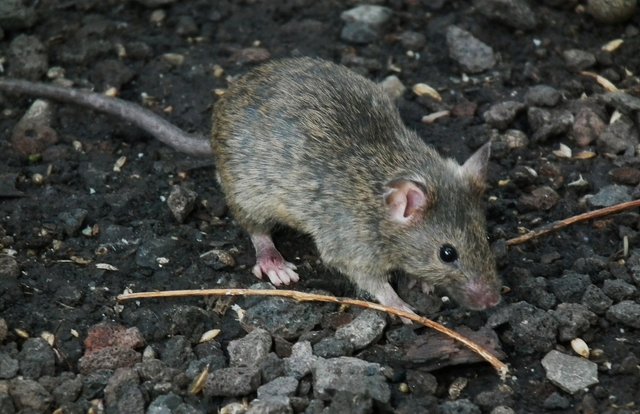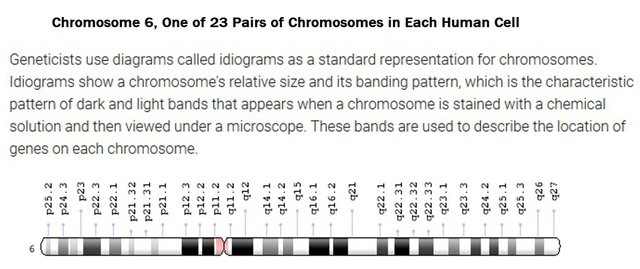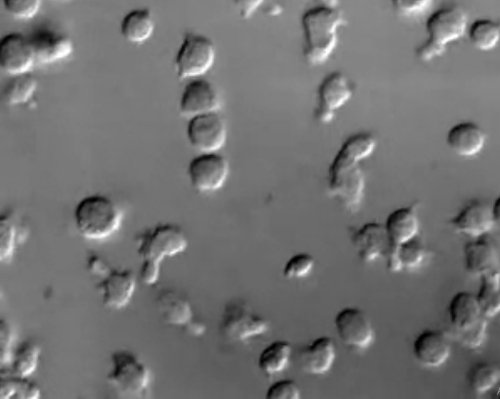Is the Love of Your Life Right Under Your Nose? Maybe, if You're a Mouse
The Hutterite

The Hutterite--a group of people who live in self-segregation--offer an opportunity for studying human mating preferences. This picture of Hutterite women was taken by Rainer Mueller at the Greenwood Hutterite Colony near Delmont, South Dakota. The picture is used under a Creative Commons-Attribution Share Alike 3.0 license.
Ahh, the wonder of love. Plumbing the mystery of passion, the force that drives two people together, has occupied the attention of the world's greats poets. The subject has also drawn the attention of the world's scientists. For, with the cold calculation of a pathologist, scientists have investigated the bond that unites unattached individuals and makes them a pair. The body of research conducted to discover the mechanism of this coupling is quite large. And, because scientists need to describe the phenomenon of pairing, they have assigned it a typically scientific name: assortative mating.

The picture is of a common house mouse. Mice and humans have almost the same genes--there are about 10 genes that we don't share--although the arrangement of those genes on chromosomes is not the same. For example, MHC genes are located on the number 6 chromosome in humans and number 17 chromosome in mice.
Picture credit: 4028mdk09. Used under a Creative Commons-Share Alike 3.0 Unported License
Most of us can recall marriages in which, over the years, couples seem to grow to be alike. We may wonder, did they start out that way, or did they become that way by living together? Scientists have a name for this acquired similarity: convergence. Assortative mating is distinct from convergence. What assortative mating means is, people (and other vertebrate) don't choose their mates randomly, but go through a sort of conscious and unconscious process of selecting candidates. Scientists would like to understand the system by which people, and other vertebrate, sort their mates. How is one candidate chosen over another? If the selection process is not random, then what is the methodology that determines outcome?
If we think about it, society, and most living things, are significantly invested in mating. When it comes to humans, sexual pairing has been the only means of reproduction (I know, I know--cloning and test tubes--but these have nothing to do with 'love' and traditional mating). So, how do people match up? How do they decide on the ideal partner?
According to researchers, a few factors enter into the process of coupling. Statistically, people tend to select--sort--on the basis of some similar traits. Intelligence, height and body weight are among these. The tendency to sort by similarity is not 100% reliable, but it is statistically significant. When a mating choice is made based on specific factors this is called positive assortative mating. There is also negative assortative mating--disassortative mating--which results in the rejection of a prospective mate.
It May Not Be Love, But It Is Mating
This doesn't sound a lot like love, as we experience it, but by understanding both negative and positive assortative mating, scientists are hoping to understand what makes us feel that we love someone. And they hope to understand how that feeling leads us to decide to pair up and reproduce.
One thing to keep in mind as we go through the different factors that influence mating is that there is disagreement in the research community. As thoroughly as this subject has been examined, consensus eludes researchers--unless they're dealing with mice.
Mice are easy to study. They can be be confined in a laboratory. They can be subjected to controlled experiments (which I find morally reprehensible) and their short mating cycles and lifespans (particularly in a laboratory) allow for easy observation. Mouse studies show definitely that positive assortative mating does take place in that species.

In addition to being essential to the immune response, chromosome 6 also carries the potential to pass certain diseases from one generation to the next. These diseases include early-onset Parkinsonism, and ankylosing spondylitis. The diseases are autosomal recessive and may only be expressed if two people who have the potential to pass them on come together and reproduce.
Image credit: NCBI
Perhaps the most intriguing--and controversial--assortative mating factor is something called MHC, major histocompatibility complex. In humans, as distinct from other vertebrates, this complex is called HLA, human leukocyte antigen complex. This complex is essential for an effective immune response. Molecules from the MHC complex interact with T cells to recognize and kill pathogens. These molecules are also effective at detecting and helping to destroy cancer cells.
MHC molecules are primed to recognize a wide spectrum of pathogens. It is possible to mate with someone who has a different MHC than your own. Which means that offspring that result from such a pairing (parents with different MHC genes) will inherit two sets of MHC genes. When it comes to the immune complex, two sets are better than one. This offers a broader immune defense

This image shows T cells adhering to other cells as part of an immune response. You can watch the T cells dynamically in this video. The file is used under a Creative Commons 2.5 Generic license. Author:Ma Z, Sharp K, Janmey P, Finkel T.
This is where mouse studies involving mating and MHC become important. It seems mice are endowed with the ability to detect potential mates who have MHC genes different from their own. If they detect a mouse with the same MHC genes, they will reject that mouse. By doing this, they increase the survivability of their progeny. This detecting mechanism also affords mice a barrier to inbreeding.
How does a mouse know that another mouse has different MHC genes? It seems scent gives them the clue--although it is suspected other factors may tip them off also. Noting this positive assortative mating behavior in mice, scientists wondered, do people unconsciously choose mates using the same criteria? If humans do sort by MHC, how do they manage this? Is scent a factor?
The Smelly T-Shirt Test

One of the most well-publicized studies that tried to establish human preference based on MHC took place in 1995. Conducted by a Swiss researcher, the test required men to wear a T-shirt for two days straight. No bathing. No laundering. No deodorant. The shirts had to get good and smelly. They were then handed over to a group of women, who were asked to respond according to desirability. It turned out, women, using scent alone, showed a distinct preference for shirts that had been soiled by men who had MHC genes different from their own. Not only that, the study indicated that if a woman was on birth control pills, she lost the ability to distinguish MHC by scent.
To this day, the dirty shirt study influences public opinion and the direction of other studies on human assortative mating. Over the last twenty years, the results of these studies have not been consistent.
For example, a report released by Cold Spring Harbor Laboratories in 2018 described results that refuted the Swedish study. Cold Spring Harbor concluded that people who paired off showed no greater or lesser likelihood of mating based on MHC than they would have with random selection. This study looked at "239 mate-pairs of Dutch ancestry" and concluded that MHC had no effect on mate selection.
And then there is the special case of the Hutterites, featured in the picture at the beginning of this blog. A 1997 study looked at the distribution of MHC genes in this socially isolated group. The Hutterites are part of a religious sect and have settlements all over the world. The researchers thought, given the limited gene pool in which pairings would take place, they might be able to detect if assortative mating was occurring.
The results seemed to prove that there was negative assortative matingwith reference to MHC. There was a much higher incidence of MHC disparity between spouses than would be statistically predicted in such a small, confined group. What the study did not discover, was the process by which partners where able to choose mates with different MHC.

The notion that humans are able to detect MHC genes, whether through scent, or some other means, is intriguing. It certainly seems that if other vertebrate have this ability, humans ought to. But, sweaty t-shirt test not withstanding, the proof is not here yet.
Do you enhance your attractiveness to the opposite sex when you wear perfume, or do you mask it? There actually have been perfume studies related to MHC. One of these, (Evidence for MHC-Correlated Perfume Preferences in Humans, by Manfred Milinski of the Max Planck Institute and Claus Wedekind of the University of Lausanne) showed that a preference does exist based on MHC. The preference is mild, but definite. Interestingly, what the study showed was that people are likely to choose a scent that emphasized, "in some way body odors that reveal a person's immunogenetics", not one that masked native odor.
So, if you wish to find the ideal mate, should you wear perfume? It's hard to say--unless you're a mouse. Then the answer is definitely, "No".

Some Sources Used in Writing This Blog
https://www.ncbi.nlm.nih.gov/pubmed/10757643
https://www.britannica.com/science/assortative-mating
https://www.genome.gov/10001345/importance-of-mouse-genome/
https://link.springer.com/article/10.1007/BF00992848
https://www.csmonitor.com/Environment/Wildlife/2009/0730/why-organisms-reproduce-the-way-they-do
http://www.sciencemag.org/news/2017/01/your-choice-life-partner-no-accident
https://www.livescience.com/32860-why-do-medical-researchers-use-mice.html
https://www.ncbi.nlm.nih.gov/pmc/articles/PMC3678478/
https://www.ncbi.nlm.nih.gov/pmc/articles/PMC1377254/
https://www.google.com/search?ei=KP-ZW4zmOerc5gLRtLW4Cg&q=Ankylosing+spondylitis+recessive+gene+for+diseases+on+chromosome+6&oq=Ankylosing+spondylitis+recessive+gene+for+diseases+on+chromosome+6&gs_l=psy-ab.12...9410.12981..13986...0.0..0.179.251.1j1......0....1j2..gws-wiz.......0i71j33i10.lf96oWUMjYk
https://medlineplus.gov/ency/article/002052.htm
https://www.ncbi.nlm.nih.gov/books/NBK27156/
https://ghr.nlm.nih.gov/primer/genefamily/hla
https://www.pbs.org/wgbh/evolution/library/01/6/l_016_08.html
https://www.biorxiv.org/content/early/2018/06/04/339028
HLA and Mate Choice in Humans, by Ober, etal
https://www.researchgate.net/publication/31314605_Evidence_for_MHC-Correlated_Perfume_Preferences_in_Humans
This is a very interesting post. I wish that I had caught it in time to up-vote.
I'm addicted to writing and I put a lot into my work--good feedback means a great deal. Thanks.
there's your upvote, then :)
Keep up the good work!
That's really generous...thank you for the vote, and the gesture :)
Finally I can come to your article. Very much appreciate your critical attitude to it and not presenting science as carved in stone. I find this is needed as in the mass media a lot of nonsense is done with "studies" and "latest scientific findings".
That caused me to catch up on a thought I recently had and almost forgot. The mating thing we usually attribute to the younger generation. It becomes kind of weird when older folks still are on the hunt, so to speak. I guess, it is more of an underlying expectation from the surrounding people when they see over 40s or 50s still on the "market" on the search for mating. It's kind of embarrassing when one is clothed and styled like a youngster and generally the young ones pity those who try to mingle themselves in and hope for a match.
I for myself think that there is a "right" time in life to be on the market as a potential mating partner. Once it fades out, one is not that interesting any more. We know this as a "truth" (exceptions confirm the rule).
I also would throw in that one actually might follow the evolutional programming (once one is free to do so) and mate with a partner which differs a lot genetically but still finds it not the right match. As intelligence is perceived somehow and the concept of life mingle with social influences and culture the biology might be a perfect match but sociology makes a halt to maintain the relationship any further (my unscientific approach here:)
Also, the chance to marry into a higher hierarchy (financially) does not happen that much, is my guess. The romance where a poor maiden (more modern secretary) marries the wealthy landlord (professor or owner of a good running family business) is always good for a story but when I should give an estimate I would also say it's more of an exception.
The question whether one likes to smell the different sex would be interesting to investigate. Is the ability to sniff it out still there even when a perfume overrides the natural smell?
HaHa! That is so typical human. We always can surprise one another!
So, we intuitively choose the perfume which supports our natural odor? Thats hilarious.
In general, the nature vs. nurture discussion is being held.
I think you are a person who would place an "and" between the two and include other, unknown factors as well. Those, from which we have no knowledge and from which we might never have it (room for uncertainty and stay relaxed about it).
A pleasure to find your comment as I opened my browser this morning. There's definitely enduring mystery about sexual attraction--and what may be a separate issue--pairing in order to form a family. As you rightly suggest, socioeconomic factors are likely stronger than any "smell" :)
Intuitively, it is my guess that we are engineered to "smell" our mates, but that as with so much else, primitive instinct is generally overwhelmed by socialization. With age, sense of smell declines (what doesn't?), and this is logical in an evolutionary sense--especially for women. We don't need that biological assist to find an appropriate mate because after menopause MHC is irrelevant--the question of reproduction is off the table.
I'm brewing another blog now--tangentially related to this--but don't see that it can be done before Monday or Tuesday. Do you think the hardfork (due on Tuesday) will be an issue for blogging/voting/etc?
I'm thinking of last week's service interruption.
HeHe, and I am indeed happy that it's off the table. Some insecurities go with it as well and one doesn't have to bother with them.
Sometimes I am torn between an ever curious mind and to lift the cloak of mystery or simply to enjoy myself in a certain uncertainty.
With the hardfork, I have no idea. It happened already two times as far as I can remember and always started to run smoothly again. But to be safe I would wait up the date.
I am kind of also hoping for a steemstem vote on my newest article which had cost me a hell lot of research. But I have not payed attention to the business of the steemstemmers and so maybe it will go unnoticed. I am not always the cleverest in choosing the schedules.
I just saw the post and will give it a good read. I like to pay attention because your blogs are always quite thorough. I hope steemstem supports it. Networking is not my strength--not in the virtual universe or the physical universe. Banter sometimes goes over my head. But I do support good work, people who support me, and a few bloggers who need a boost. After that, I hope for the best. Fortunately, I like science a lot, so those blogs are interesting. Creative writing posts seem to get less material reward, but they are rewarding in another way, aren't they?
I'm going to drink my morning coffee, wake up a bit more, and check out your blog.
oh yes, they are rewarding. I felt a boost myself in free writing - as a result to participate in the @bananafish s finishing the story contests as well as in the 50 words stories. I noticed that those things have a little delay on me and the full power of engaging in the fiction writing space arrives later on.
I truly enjoy that and actually I would write even more but am afraid that my blog would burst. I don't want readers to be overwhelmed by so much content. So I skip some rounds when I do not find the real kick also.
But when inspiration sets in it is almost unstoppable, right? Then it has to come out:)
I will go and have an evening coffee.
P.S. in further dialogue I do not click the vote button.
:)
This post has been voted on by the steemstem curation team and voting trail.
There is more to SteemSTEM than just writing posts, check here for some more tips on being a community member. You can also join our discord here to get to know the rest of the community!
Thank you steemStem. Just turned on my computer. What a nice surprise. Glad I made the cut, grateful for your support!
@agmoore!! 😃
You took our brief discussion to another level! I read this whole post with a smile on my face. I learnt so many new things here! Still, I don't think one's antigens can be more attractive than their middle finger, or even better, their earlobes 😛
Much love to you my dear :*
You are wonderful to see our discussion in this post. I wanted to reference you, but thought that might be presumptuous--I try to be careful about boundaries.
Yes, I did warn you, I take ideas to exotic corners. Have to be careful around me. Thank you for the inspiration. Many of your posts will yield equally unpredictable results. From rich content, much grow :)
Thank you so much, my dear friend.
I can see that! 😜
Now, I need to ask a question that has been bugging me since that day: If as gift from London you requested a newspaper and from Paris a map of the Louvre. What would you like from Portugal?
Much love to you!
Ha Ha
I didn't ask. She knew :))
And yes, Portugal is her plan for next year. Are you also clairvoyant?
I can't imagine what she'll bring, but it will be perfect, whatever it is.
And much love to you!
Hi @agmoore!
Your post was upvoted by utopian.io in cooperation with steemstem - supporting knowledge, innovation and technological advancement on the Steem Blockchain.
Contribute to Open Source with utopian.io
Learn how to contribute on our website and join the new open source economy.
Want to chat? Join the Utopian Community on Discord https://discord.gg/h52nFrV
I am grateful. @ruth-girl suggested I choose you as witness. I did that yesterday.
Thanks again for the support and endorsement.
Thank you for the witness vote. Utopian appreciate that.
You guys are great--thank you!
That reminded me to vote for @utopian-io as a witness, too. Just did it.
Yeah...use those valuable witness votes for witnesses that actually do good work :)
I didn't know that research work on Hutterites so thanks.
There is evidence that sexual preference is also part nurture. This - > https://www.ncbi.nlm.nih.gov/m/pubmed/23954746/ research work studies fetish devolpment in rats. More specifically, they were able to nurture rats such that they had a fetish for rats in jackets. Pretty interesting stuff.
Posted using Partiko Android
Thanks for the link. I'm not surprised. Even with mice, the mechanism for identifying MHC is not clear--one study shows that it likely comes not from self examination but from identification of MHC in the family unit--a kind of imprinting.
I do think, though, the jacket routine is a little peculiar. Those research scientists may have spent entirely too much time in the laboratory with small furry animals :)